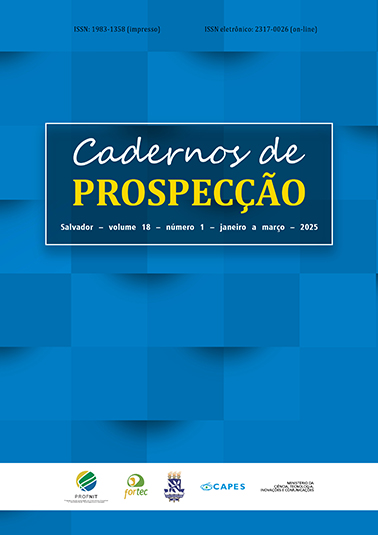Use of MDMA (Ecstasy) in Psychotherapy Sessions for the Treatment of Chronic PTSD: a bibliometric study
DOI:
https://doi.org/10.9771/cp.v18i1.60455Keywords:
MDMA, PTSD, Psychotherapy.Abstract
This article is a literature review regarding the clinical use of the substance 3,4-Methylenedioxymethamphetamine, also known as MDMA or Ecstasy, to assist in psychotherapy sessions in the treatment of post-traumatic stress disorder (PTSD). Due to the symptomatic characteristics, the disorder is commonly treated with antidepressants, which act on neurotransmitters in addition to psychotherapeutic monitoring. However, some patients do not adapt to the available treatment and the disorder becomes chronic. To search for articles, the PubMed and Scielo databases were used. To search for patents and their technologies, the Orbit Intelligence platform was used, using “MDMA” or “3,4-Methylenedioxyamphetamine” as keywords. The most recent articles demonstrate that MDMA is a potential substance to assist psychotherapy in the treatment of PTSD. Furthermore, the technologies most associated with MDMA innovations are present in patents, such as patent application “JP2023549405”, for an MDMA prodrugs.
Downloads
References
APA – AMERICAN PSYCHIATRIC ASSOCIATION. DSM-5, Porto Alegre: Grupo A, 2016. (E-book). ISBN 9788582711835. Disponível em: https://integrada.minhabiblioteca.com.br/#/books/9788582711835/. Acesso em: 3 out. 2023.
BEAR, M. F. et al. Neurociências. Porto Alegre: Grupo A, 2017. (E-book). ISBN 9788582714331. Disponível em: https://integrada.minhabiblioteca.com.br/#/books/9788582714331/. Acesso em: 14 jan. 2024.
BERSHAD, A. K. et al. MDMA does not alter responses to the Trier Social Stress Test in humans. Publimed, [s.l.], v. 234, n. 14, p. 2.159-2.166, 2018.
DALGALARRONDO, P. Psicopatologia e semiologia dos transtornos mentais. Porto Alegre: Grupo A, 2019. (E-book). ISBN 9788582715062. Disponível em: https://integrada.minhabiblioteca.com.br/#/books/9788582715062/. Acesso em: 1º set. 2023.
DIEHL, A.; CORDEIRO, D. C.; LARANJEIRA, R. Tratamentos farmacológicos para dependência química. Porto Alegre: Grupo A, 2011. (E-book). ISBN 9788536322445. Disponível em: https://integrada.minhabiblioteca.com.br/#/books/9788536322445/. Acesso em: 1º set. 2023.
ECONOMIST, The. How MDMA is being used to treat PTSD. YouTube, 11 de out. de 2018. Disponível em: https://www.youtube.com/watch?v=8K5sJuTbQvY. Acesso em: 1º nov. 2023.
ELISABETSKY, E. et al. Descomplicando a psicofarmacologia. São Paulo: Editora Blucher, 2021. (E-book). ISBN 9786555062717. Disponível em: https://integrada.minhabiblioteca.com.br/#/books/9786555062717/. Acesso em: 1º set. 2023.
FORD, S. M. Farmacologia Clínica. Rio de Janeiro: Grupo GEN, 2019. (E-book). ISBN 9788527735681. Disponível em: https://integrada.minhabiblioteca.com.br/#/books/9788527735681/. Acesso em: 1º set. 2023.
INPI – INSTITUTO NACIONAL DA PROPRIEDADE INDUSTRIAL. Sobre o INPI. 2024. Disponível em: https://www.gov.br/inpi/pt-br. Acesso em: 2 abr. 2024.
MORGAN, L. MDMA-assisted psychotherapy for people diagnosed with treatment-resistant PTSD: What it is and what it isn’t. Annals of General Psychiatry, [s.l.], v. 19, n. 1, p. 1-7, 2020.
MYDECINE INNOVATIONS GROUP. Short-acting psychoactive compounds from the MDMA class. US11896577. Depósito: 12 de junho de 2023.
OMPI – ORGANIZAÇÃO MUNDIAL DA PROPRIEDADE INTELECTUAL. O que é uma Patente? 2024. Disponível em: https://www.wipo.int/patents/en/. Acesso em: 2 abr. 2024.
ORBIT INTELLIGENCE. Página de busca. 2024. Disponível em: https://www.questel.com/patent/ip-intelligence-software/orbit-intelligence/. Acesso em: 12 jun. 2024.
PAREKH, S. V. et al. MDMA administration attenuates hippocampal IL-β immunoreactivity and subsequent stress-enhanced fear learning: An animal model of PTSD. Brain, Behavior, and Immunity – Health, [s.l.], v. 26, n. August, p. 100542, 2022.
PLUMMER, C. M. et al. The synthesis and characterisation of MDMA derived from a catalytic oxidation of material isolated from black pepper reveals potential route specific impurities. Science & Justice, [s.l.], v. 56, n. 3, p. 223-230, 2016.
RITTER, J. M. Rang & Dale Farmacologia. Rio de Janeiro: Grupo GEN, 2020. (E-book). ISBN 9788595157255. Disponível em: https://integrada.minhabiblioteca.com.br/#/books/9788595157255/. Acesso em: 20 jan. 2024.
WAGNER, M. T. et al. Therapeutic effect of increased openness: Investigating mechanism of action in MDMA-assisted psychotherapy. Journal of Psychopharmacology, [s.l.], v. 31, n. 8, p. 967-974, 2017.
YEDA RESEARCH & DEVELOPMENT. Compositions and methods for treating mdma-induced toxicity. US20050267050. Depósito: 12 de março de 2003.
ZEIFMAN, R. J. et al. Preliminary evidence for the importance of therapeutic alliance in MDMA-assisted psychotherapy for posttraumatic stress disorder. European Journal of Psychotraumatology, [s.l.], v. 15, n. 1, p. 2297536, 2024.
Downloads
Published
How to Cite
Issue
Section
License
Copyright (c) 2024 Cadernos de Prospecção

This work is licensed under a Creative Commons Attribution-NonCommercial 4.0 International License.
O autor declara que: - Todos os autores foram nomeados. - Está submetendo o manuscrito com o consentimento dos outros autores. - Caso o trabalho submetido tiver sido contratado por algum empregador, tem o consentimento do referido empregador. - Os autores estão cientes de que é condição de publicação que os manuscritos submetidos a esta revista não tenham sido publicados anteriormente e não sejam submetidos ou publicados simultaneamente em outro periódico sem prévia autorização do Conselho Editorial. - Os autores concordam que o seu artigo ou parte dele possa ser distribuído e/ou reproduzido por qualquer forma, incluindo traduções, desde que sejam citados de modo completo esta revista e os autores do manuscrito. - Revista Cadernos de Prospecção está licenciado com uma Licença Creative Commons Attribution 4.0. Esta licença permite que outros remixem, adaptem e criem a partir do seu trabalho para fins não comerciais, e embora os novos trabalhos tenham de lhe atribuir o devido crédito e não possam ser usados para fins comerciais, os usuários não têm de licenciar esses trabalhos derivados sob os mesmos termos.
Este obra está licenciado com uma Licença Creative Commons Atribuição 4.0 Internacional.








